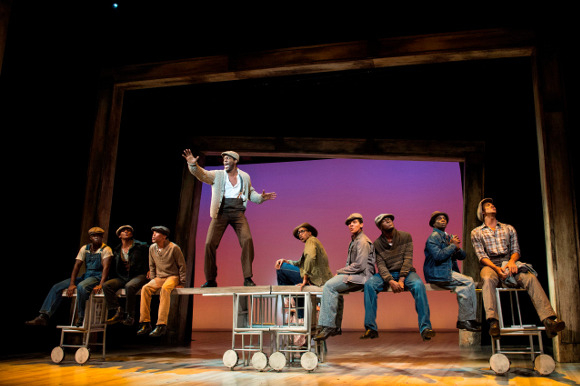The Scottsboro Boys

© Richard Hubert Smith
When the youngest four of the nine Scottsboro Boys were eventually acquitted of the trumped-up rape charge against them in the 1930s, they went straight into a vaudeville act at the Apollo in Harlem.
That fact provides the metaphor of this hard-hitting, relentless but ultimately irresistible new musical by the authors of Cabaret and Chicago, John Kander (music) and Fred Ebb (lyrics), with a book by David Thompson.
Ebb died in 2004 while still working on the show, which was brought to Broadway by director/choreographer Susan Stroman four years later, lost out in the Tony awards to The Book of Mormon (despite receiving twelve nominations) and closed after 49 performances.
The nine youths were arrested after a fracas on a freight train in 1931, indicted by a grand jury and sentenced to death; “Electric Chair” is the first song sizzler on the subject since The Fields of Ambrosia (“Where everyone knows ya”) and a vast improvement.
The all-black cast – with Julian Glover the sole white actor cheerfully playing all the authority figures as a sort of creepy emcee in a Colonel Sanders white suit and topper – includes five from the Broadway show, now joined by the extraordinary Kyle Scatliffe as Haywood Patterson, the main man, who escaped from prison in 1948, was re-arrested after a bar room brawl and convicted once again on an unrelated charge of manslaughter; he died of cancer in 1952.
After appeals and re-trials, and a few more of them released on parole, the case fizzled out with Alabama Governor George Wallace, of all people, declaring the last of the nine, Clarence Norris, not guilty in 1976. All of this legal shilly-shallying, delay and misrepresentation is vibrantly harnessed to a concert-style satirical minstrel show of cakewalks, soft-shoe shuffles, ragtime roustabout and blackface “coon” numbers, as in the vaudeville heyday.
Simple and direct in its staging – Beowulf Boritt’s design comprises a few chairs and a couple of planks, ingeniously deployed throughout – there’s hardly a moment’s let-up in two uninterrupted hours, creating a sort of vivid kangaroo court effect that doesn’t have the musical variety or impact of Chicago, nor the sex appeal; what it does have is anger in spades (sic) and a boiling sense of injustice filtered for fun.
Stroman’s production uses the minstrel show tradition of a semi-circle of chairs which the cast break up to create a series of fast-dissolving environments, while simultaneously playing the white characters – including the two simpering white women who bring the rape charge – on the railroad, in the court and in the prison.
It’s a stunningly simple concept, fuelling a grim and serious documentary with an over-the-top Broadway charge and pizazz. What the songs lack in real heft and the strangulating melodic twist of Kander and Ebb at their mordant best is made up for in the performance voltage.
And the show ends with the gracious and glorious Dawn Hope (that name will do nicely, thank you) evoking the story of Rosa Parks, the woman who famously refused to move to the back of the segregated Alabama bus in 1955. The whole evening reminds you – as if you needed reminding – that the civil rights campaign was a long time coming and will always have something to sort out.










